Nurses Narratives Sister Alma L Bennett (part 1)
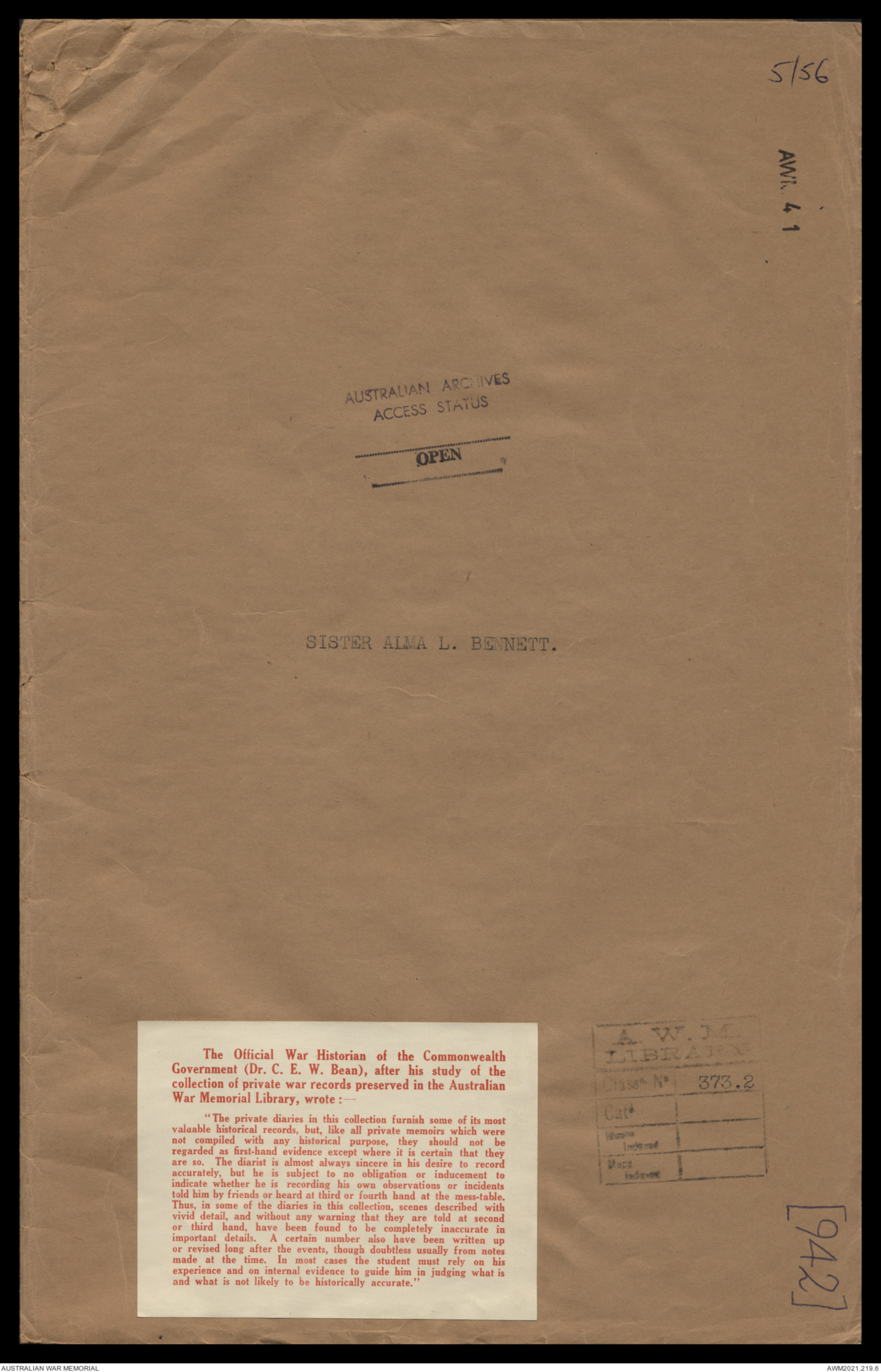
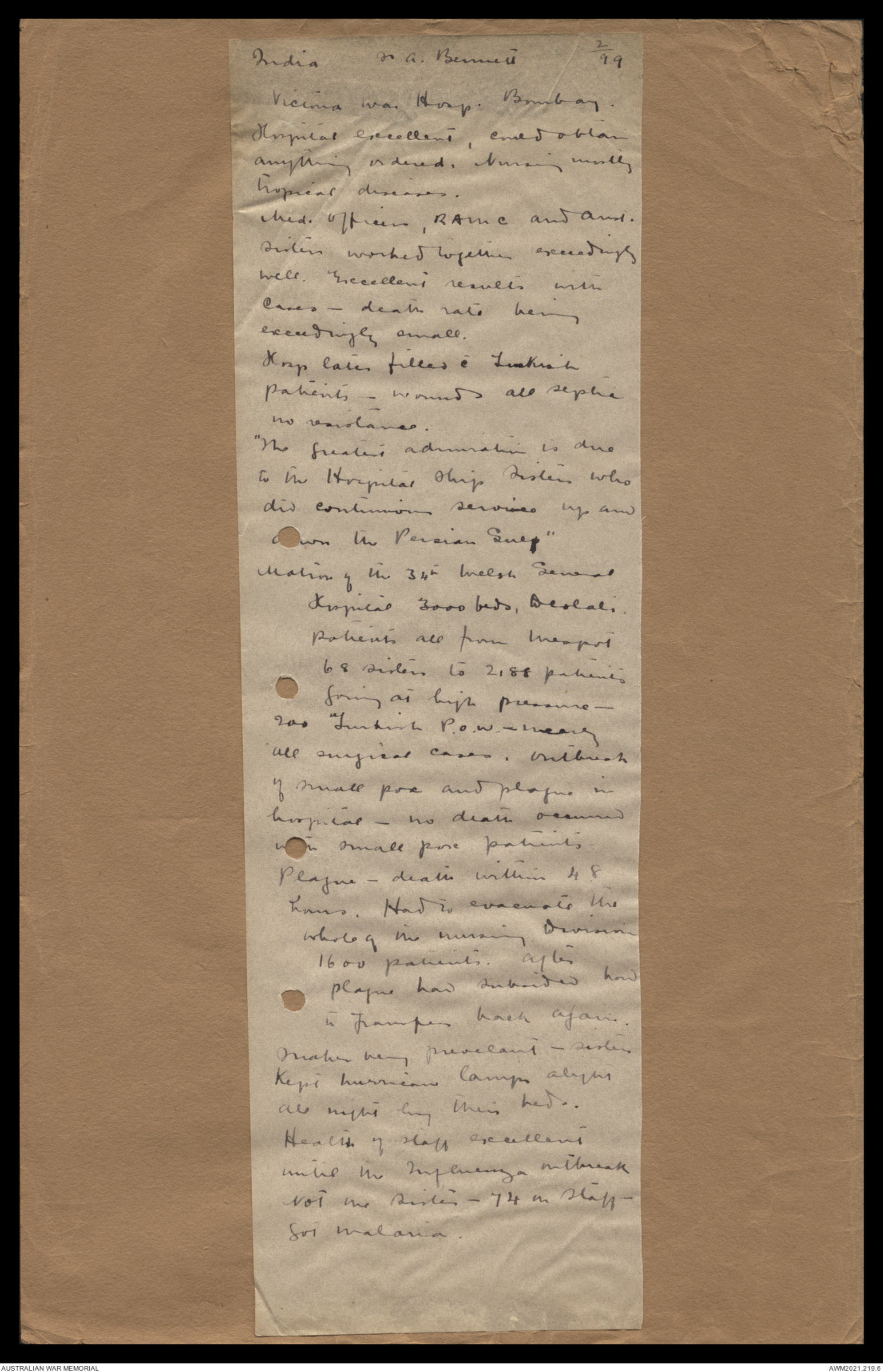
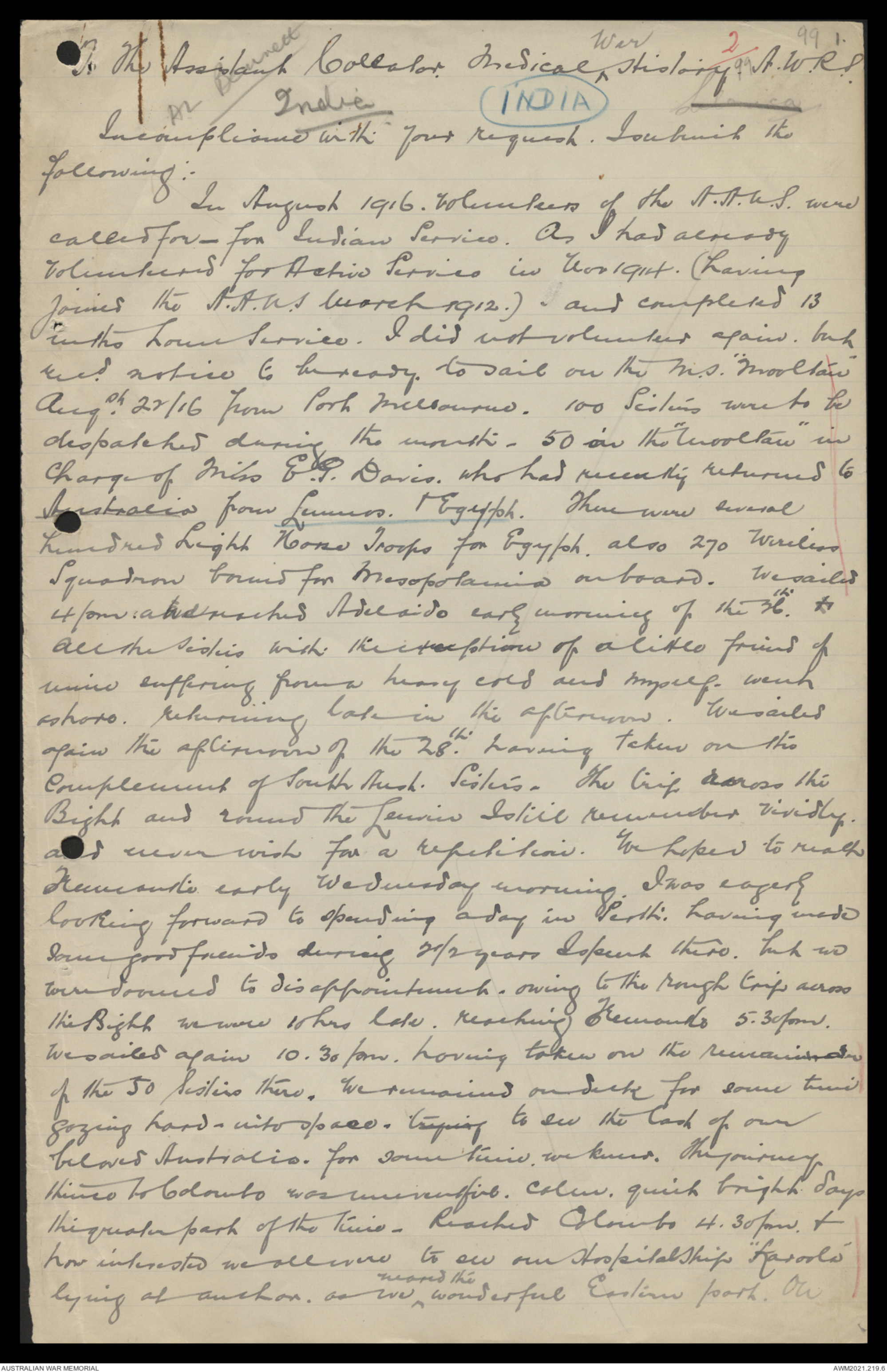
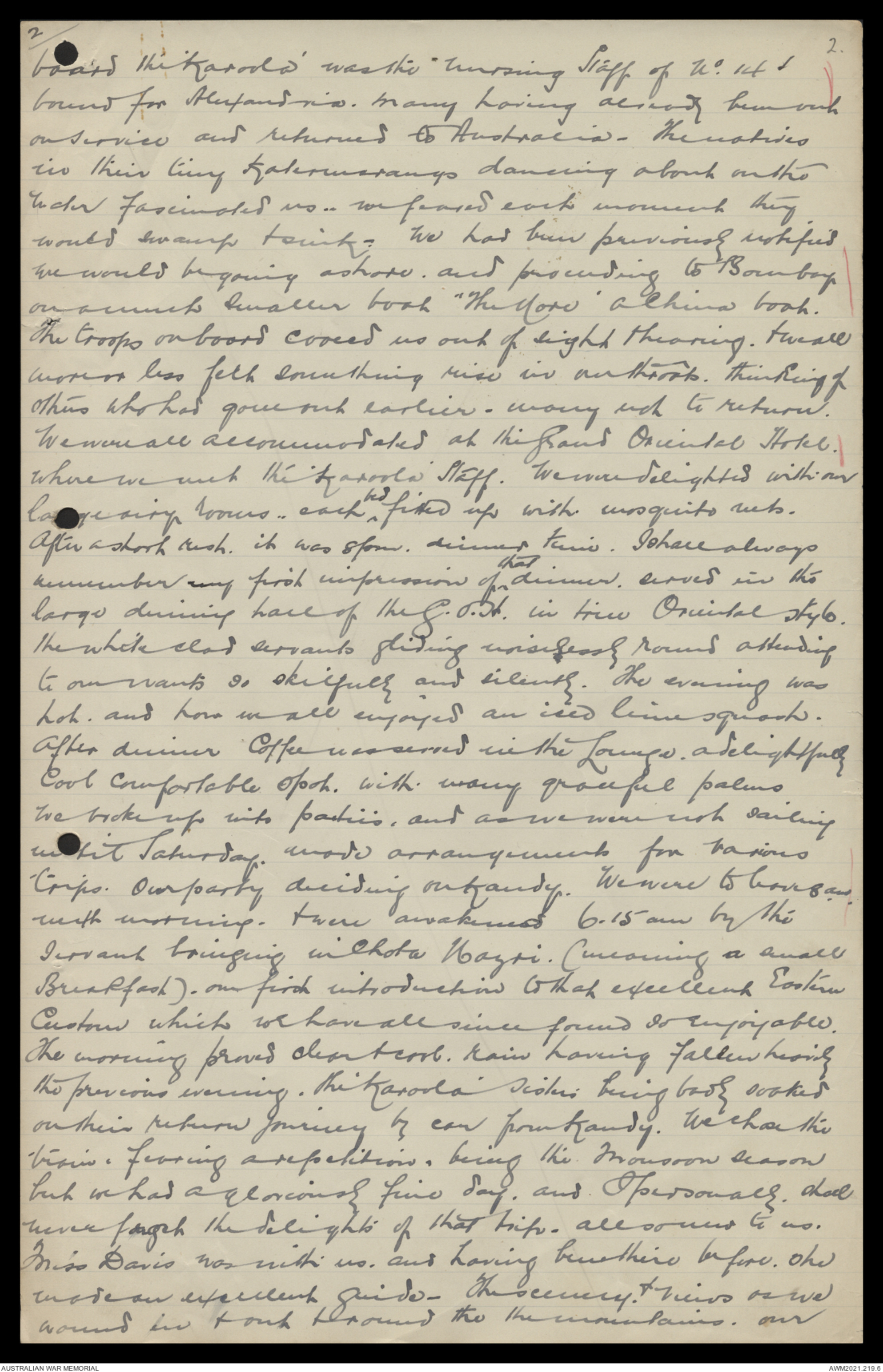
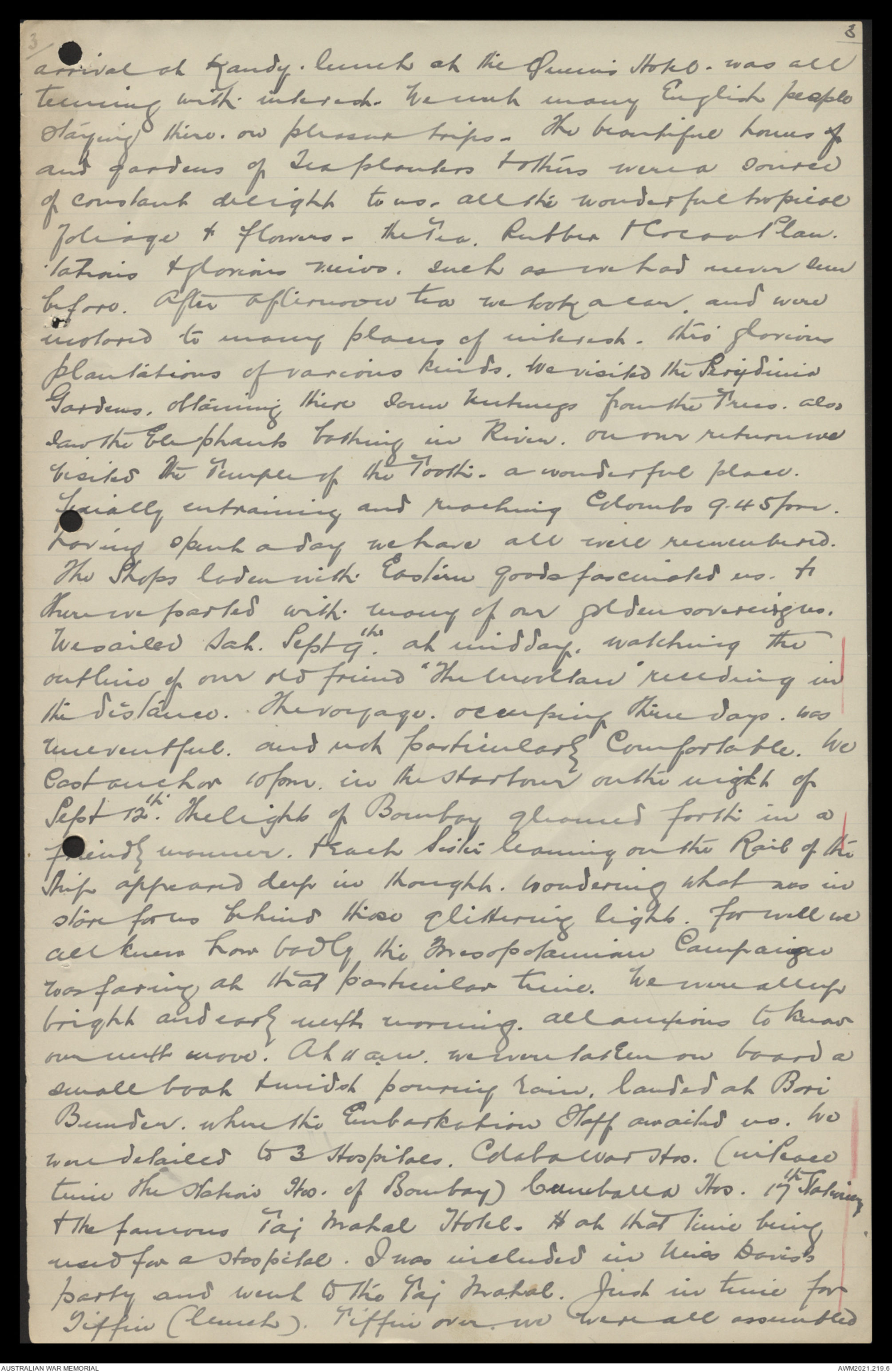
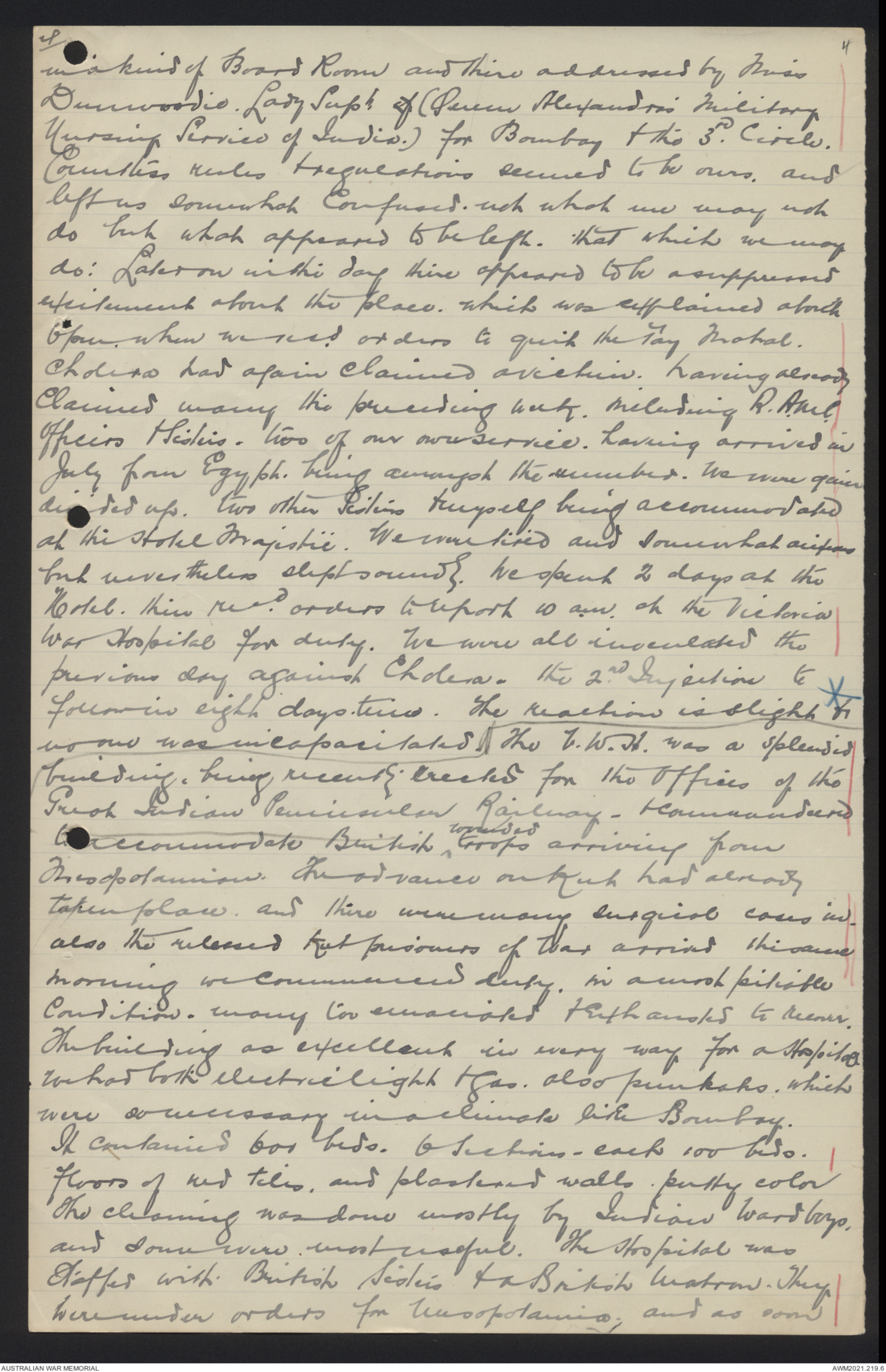
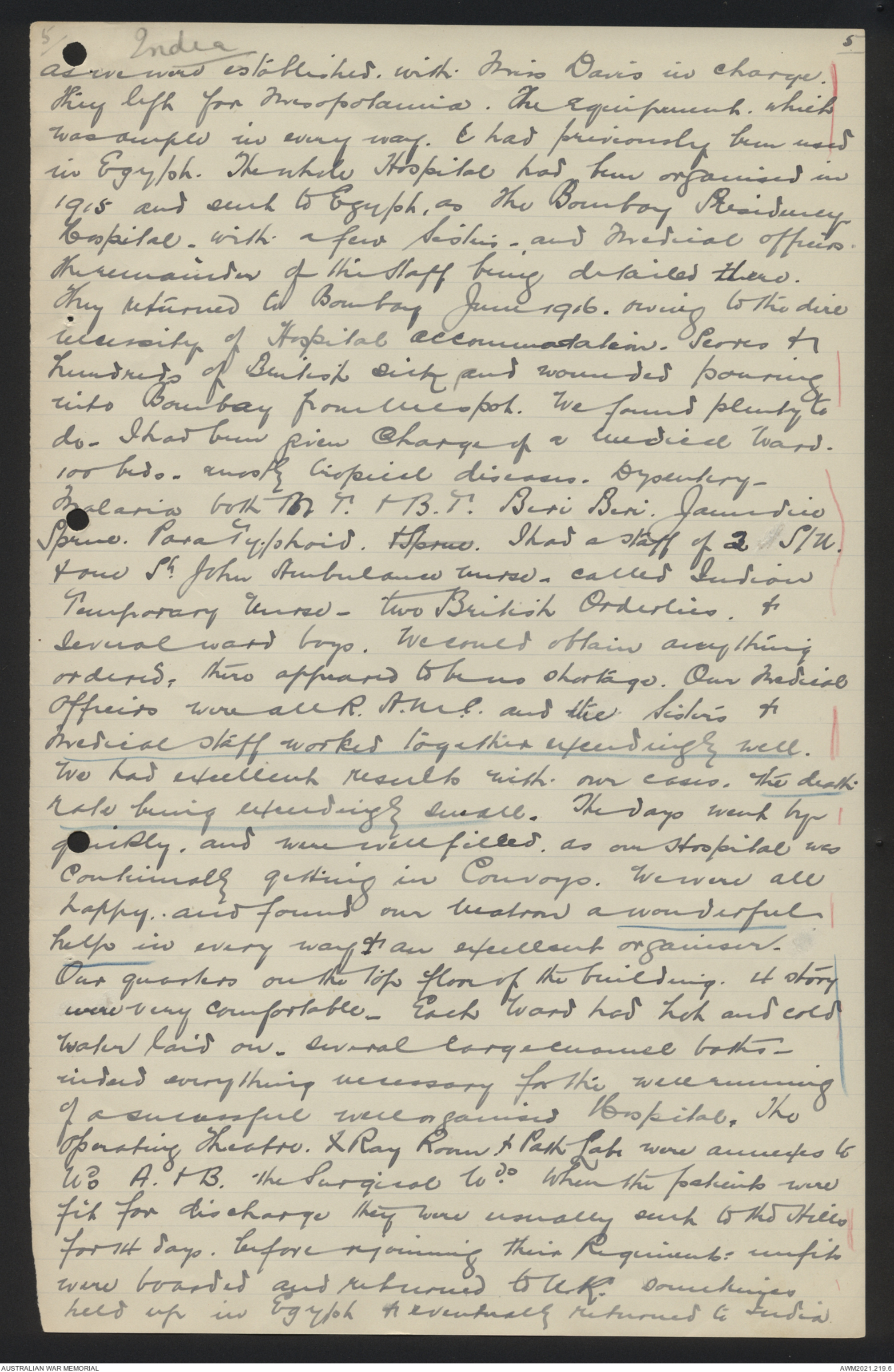
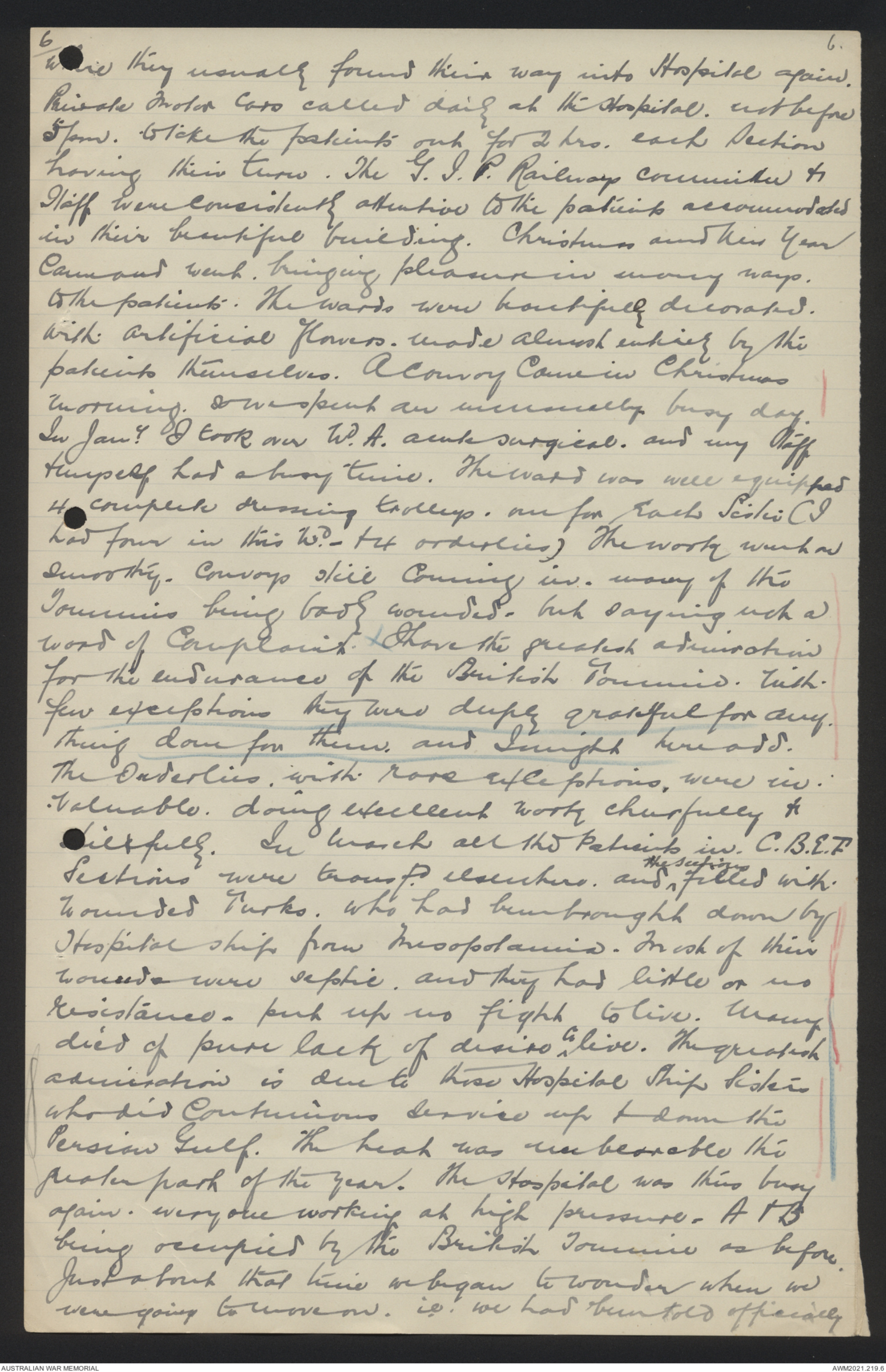
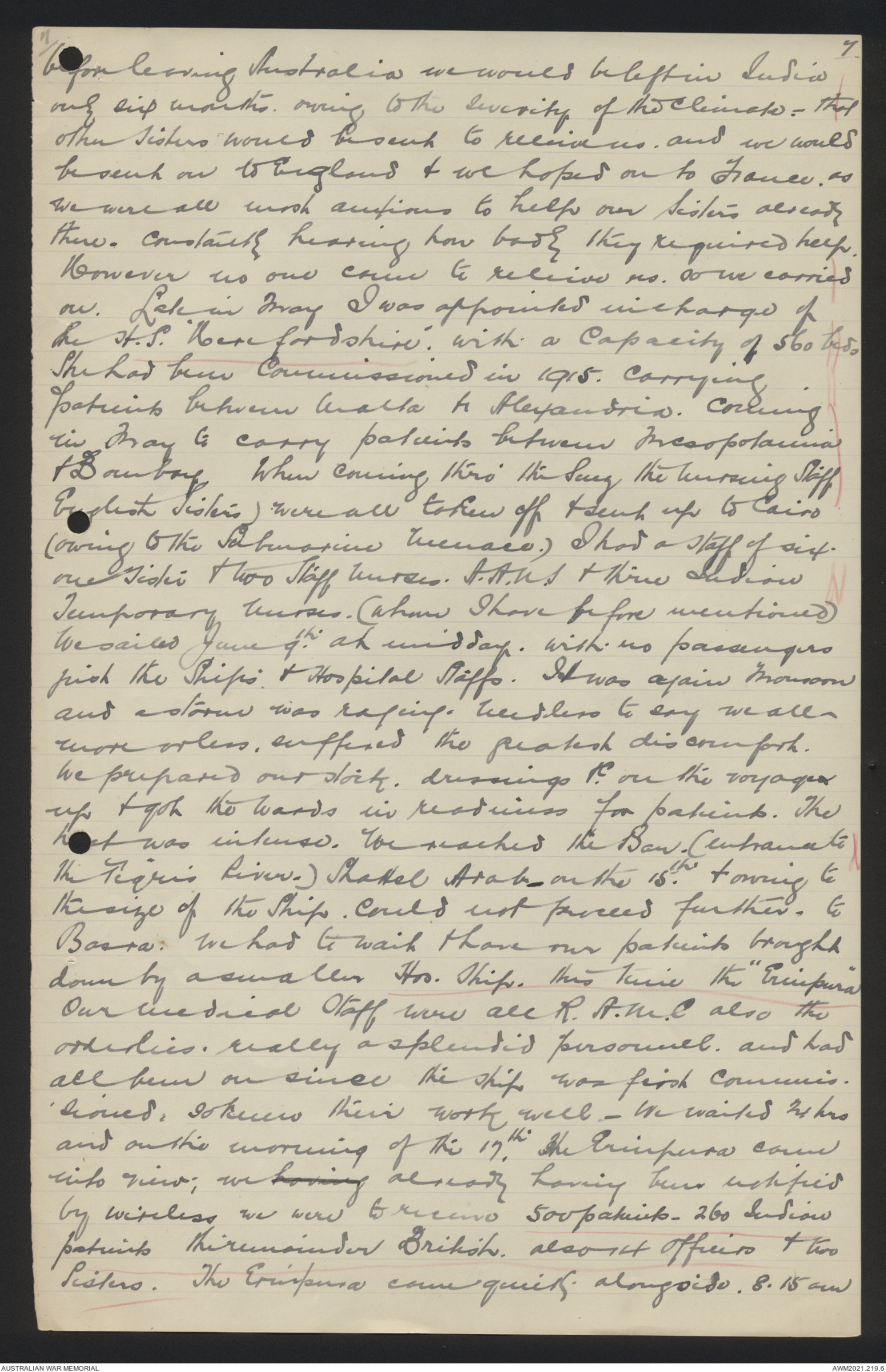
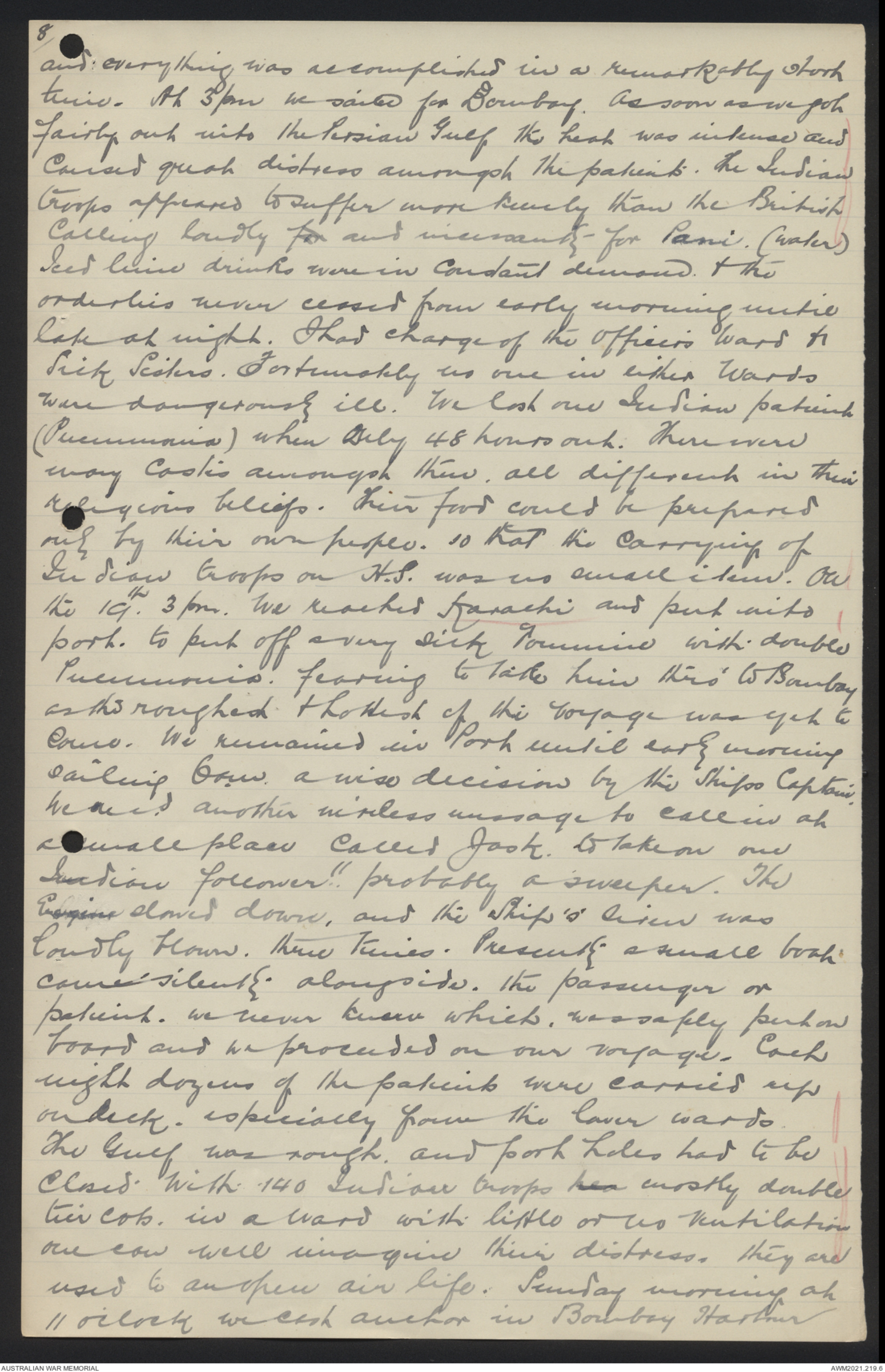
5/56
AWM 41
SISTER ALMA L. BENNETT.
The Official War Historian of the Commonwealth
Government (Dr. C. E. W. Bean), after his study of the
collection of private war records preserved in the Australian
War Memorial Library, wrote:-
"The private diaries in this collection furnish some of its most
valuable historical records, but, like all private memoirs which were
not compiled with any historical purpose, they should not be
regarded as first-hand evidence except where it is certain that they
are so. The diarist is almost always sincere in his desire to record
accurately, but he is subject to no obligation or inducement to
indicate whether he is recording his own observations or incidents
told him by friends or heard at third or fourth hand at the mess-table.
Thus, in some of the diaries in this collection, scenes described with
vivid detail, and without any warning that they are told at second
or third hand, have been found to be completely inaccurate in
important details. A certain number also have been written up
or revised long after the events, though doubtless usually from notes
made at the time. In most cases the student must rely on his
experience and on internal evidence to guide him in judging what is
and what is not likely to be historically accurate".
A.W.M.
LIBRARY
Class No 373.2
[942]
India Sr A. Bennett
2/99
Victoria War Hosp. Bombay.
Hospital excellent, could obtain
anything indeed. Nursing mostly
tropical diseases.
Med. Officers, RAMC and Aust.
sisters worked together exceedingly
well. Excellent results with
cases - death rate being
exceedingly small.
Hosp later filled w Turkish
patients – wounds all septic
no resistance.
"No greater admiration is due
to the Hospital ship sisters who
did continuous service up and
down the Persian Gulf"
Matron of the 34th Welsh General
Hospital 3000 beds, Deolali.
patients all from Mesopot
68 sisters to 2188 patients
going at high pressure-
200 Turkish P.O.W. - nearly
all surgical cases. Outbreak
of small pox and plague in
hospital - no death occurred
with small pox patients.
Plague - death within 48
hours. Had to evacuate the
whole of the nursing Division
1600 patients. After
plague had subsided had
to transfer back again.
Malaria very prevalent - sisters
kept hurricane lamps alight
all night by their beds.
Health of staff excellent
until the influenza outbreak.
Not one sister - 74 on staff -
got malaria.
2. 99 1.
To The Assistant Collator Medical War History A.W.R.S.
India
INDIA
In compliance with your request. I submit the
following:-
In August 1916. Volunteers of the A.A.N.S. were
called for - for Indian Services. As I had already
volunteered for Active Services in Nov 1914. (having
joined the A.A.N.S March 1912) and completed 13
months home Service. I did not volunteer again. but
rec.d notice to be ready to sail on the M.S. 'Mooltan'
Aug.st 22/16 from Port Melbourne. 100 Sisters were to be
dispatched during the month- 50 on the "Mooltan" in
Charge of Miss E.G. Davis, who had recently returned to
Australia from Lemnos & Egypt. There were several
hundred Light Horse Troops for Egypt, also 270 Wireless
Squadron bound for Mesopotamia onboard. We sailed
4pm and reached Adelaide early morning of the 26.th &
all the sisters with the exception of a little friend of
mine suffering from a heavy cold and myself went
ashore, returning late in the afternoon. We sailed
again the afternoon of the 28.th having taken on the
complement of South Aust. Sisters. The trip across the
Bight and round the Leeuwin I still remember vividly.
and never wish for a repetition. We hoped to reach
Freemantle early Wednesday morning. I was eagerly
looking forward to spending a day in Perth: having made
some good friends during 2½ years I spent there. but we
were doomed to disappointment. owing to the rough trip across
the Bight we were 10 hrs late. reaching Fremantle 5.30pm.
We sailed again 10.30 pm. having taken on the remainder
of the 50 sisters there. We remained on deck for some time
gazing hard - into space. trying to see the last of our
beloved Australia for some time we knew. The journey
thence to Colombo was uneventful. Calm, quiet bright days
the greater part of the time - Reached Colombo 4.30pm &
how interested we all were to see our Hospital Ship "Karoola"
lying at anchor. as we neared the wonderful Eastern port. On
2.
board the 'Karoola' was the nursing staff of No. 14
bound for Alexandria. Many having already been out
on service and returned to Australia- The natives
in their tiny Katermarangs dancing about on the
water fascinated us - we feared each moment they
would swamp & sink. We had been previously notified
we would be going ashore and proceeding to Bombay
on a much smaller boat. "The More' a china boat.
The troops on board cooeed us out of sight & hearing. & we all
more or less felt something rise in our throats. thinking of
others who had gone out earlier - many not to return
We were all accommodated at the Grand Oriental Hotel.
where we met the 'Karoola' Staff. We were delighted with our
large airy rooms. each bed fitted up with mosquito nets.
After a short rest. it was 8pm. dinner time. I shall always
remember my first impression of that dinner. served in the
large dining hall of the G.O.H. in true Oriental style.
The white clad servants gliding noiselessly round attending
to our wants so skilfully and silently. The evening was
hot. and how we all enjoyed an iced lime squash.
After dinner Coffee was served in the Lounge. a delightfully
Cool Comfortable spot. with many graceful palms
we broke up into parties, and as we were not sailing
until Saturday. made arrangements for various
trips. Our party deciding on Kandy. We were to leave 8am
next morning. & were awakened 6.15 am by the
servant bringing in chota nazri. (meaning a small
Breakfast). our first introduction to that excellent Eastern
Custom which we have all since found so enjoyable
The morning proved clear & cool. rain having fallen heavily
the previous evening. The 'Karoola' sisters being badly soaked
on their return journey by car from Kandy. We chose the
train. Fearing a repetition, being the Monsoon season
but we had a gloriously fine day, and I personally shall
never forget the delights of that trip. all so new to us.
Miss Davis was with us. and having been there before she
made an excellent guide - The scenery & views as we
wound in & out & round the the mountains. our
3
arrival at Kandy. lunch at the Queen's Hotel. was all
teeming with interest. We met many English people
staying there. on pleasure trips. The beautiful houses of
and gardens of tea planters & others were a source
of constant delight to us. all the wonderful tropical
foliage & flowers - the tea. Rubber & coconut Plantations
& glorious views. such as we had never seen
before. After afternoon tea we took a car, and were
escorted to many places of interest. This glorious
plantations of various kinds. We visited the Prydinia
Gardens, obtaining there some nutmegs from the trees. also
saw the Elephants bathing in River. on our return we
visited the Temple of the Tooth- a wonderful place.
finally entraining and reaching Colombo 9.45pm.
having spent a day we have all well remembered.
The Shops laden with Eastern goods fascinated us. &
there we parted with many of our golden sovereigns.
We sailed Sat. Sept 9th at midday, watching the
outline of our old friend 'The Mooltan' receding in
the distance. The voyage. occupying three days was
uneventful and not particularly comfortable. We
cast anchor 10pm. in the harbour on the night of
Sept 12th. The lights of Bombay gleamed forth in a
friendly manner. & each sister leaning on the Rail of the
Ship appeared deep in thought. wondering what was in
store for us behind those glittering lights. For well we
all knew how badly the Mesopotamian Campaign
was faring at that particular time. We were all up
bright and early next morning. all anxious to know
our next move. At 11 am. we were taken on board a
small boat &amidst pouring rain, landed at Bori
Bunder. where the Embarkation Staff awaited us. We
were detailed to 3 Hospitals. Colaba War Hos. (in Peace
time the station's Hos. of Bombay) Cumballa Hos. 17th [[Station]]
& the famous Taj Mahal Hotel. H at that time being
used for a Hospital. I was included in Miss Davis's
party and went to the Taj Mahal. Just in time for
Tiffin (lunch). Tiffin over we were all assembled
4
in a kind of Board Room and there addressed by Miss
Dunwoodie. Lady Supt of (Queen Alexandria Military
Nursing Services of India) for Bombay & the 3rd Circle.
Countless rules & regulations seemed to be ours, and
left us somewhat confused not what we may not
do but what appeared to be left. that which we may
do: Later on in the day there appeared to be a suppressed
excitement about the place. which was explained about
6pm when we rec.d orders to quit the Taj Mahal.
Cholera had again claimed a victim. having already
claimed many the preceding week. including R.A.M.C
officers & sisters. two of our own service. having arrived in
July from Egypt being amongst the numbers. We were again
divided up. two other sisters & myself being accommodated
at the Hotel Majestic. We were tired and somewhat anxious
but nevertheless slept soundly. We spent 2 days at the
Hotel. Then rec.d orders to report 10 am. at the Victoria
War Hospital for duty. We were all inoculated the
previous day against Cholera - the 2.d injection to
follow in eight days time. The reaction is slight &
no one was incapacitated. The V.W.H. was a splendid
building, being recently treated for the offices of the
Great Indian Peninsulan Railway - & commandeered
to accommodate British wounded troops arriving from
Mesopotamian. The advance on Kut] had already
taken place. and there were many surgical cases in.
also the released Kut prisoners of War arrived the same
morning we commenced duty, in a most pitiable
condition. many too emaciated & exhausted to recover.
The building as excellent in every way for a Hospital
We had both electric light & gas. also punkahs, which
were so necessary in a climate like Bombay.
It contained 600 beds. 6 sections - each 100 beds.
Floors of red tiles, and plastered walls. putty color
The cleaning was done mostly by Indian Ward boys
and some were most useful. The Hospital was
staffed with British Sisters & a British matron. They
were under orders for Mesopotamia. and as soon
5 India
as we were established with Miss Davis in charge.
they left for Mesopotamia. The equipment. which
was awful in every way. & had previously been used
in Egypt. The whole Hospital had been organised in
1915 and sent to Egypt, as The Bombay Presidency
Hospital with a few Sisters- and Medical officers.
The remainder of the staff being detailed there.
they returned to Bombay June 1916. owing to the dire
necessity of Hospital accommodation. Scores &
hundreds of British sick and wounded pouring
into Bombay from Mespot. We found plenty to
do- I had been given charge of a medical ward.
100 beds- mostly tropical diseases. Dysentery -
Malaria both MT. & B.T. Beri Beri. Jaundice
Sprue. Para Typhoid. &Sprue. I had a staff of 2 S/U
& one St. John Ambulance nurse - called Indian
Temporary Nurse - two British Orderlies. &
several ward boys. We could obtain anything
ordered, there appeared to be no shortage. Our medical
Officers were all R. A.M.C. and the Sisters &
medical staff worked together exceedingly well.
We had excellent results with our cases. The death
rate being exceedingly small. The days went by
quickly, and were well filled as our Hospital was
continually getting in Convoys. We were all
happy and found our matron a wonderful
help in every way & an excellent organiser.
Our quarters on the top floor of the building. 4 story
were very comfortable - Each ward had hot and cold
water laid on. several large enamel baths -
indeed everything necessary for the well running
of a successful were organised Hospital. The
operating Theatre. X-Ray Room & Path Lab were annexes to
Wd A. & B. The Surgical Wd When the patients were
fit for discharge they were usually sent to the Hills
for 14 days. before rejoining their Regiments - unfit
were boarded and returned to U.K. sometimes
held up in Egypt & eventually returned to India
6
where they usually found their way into Hospital again.
Private motor cars called daily at the Hospital. not before
5pm.. to take the patients out for 2 hrs. each section
having their turn. The G. I. P. Railway committee &
staff were consistently attentive to the patients accommodated
in their beautiful building. Christmas and New Year
came and went, bringing pleasure in many ways.
to the patients. The wards were beautifully decorated.
with artificial flowers. made almost entirely by the
patients themselves. A convoy came in Christmas
morning. so we spent an unusually busy day
In Jan4. I took over Wd. A acute surgical. and my staff
& myself had a busy time. The ward was well equipped
4 complete dressing trolleys. one for each sister (I
had four in this Wd - & 4 orderlies) The work went on
smoothly. Convoys still coming in. many of the
Tommies being badly wounded- but saying not a
word of complaint. I have the greatest admiration
for the endurance of the British Tommies. with
few exceptions they were deeply grateful for any.
thing done for them and I might here add
the orderlies, with rare exceptions, were in-
valuable. doing excellent work cheerfully &
skillfully. In March all the Patients in. C.B.E.F
Sections were transfd elsewhere. and the sections filled with.
wounded Turks. who had been brought down by
Hospital ship from Mesopotamia. Most of their
wounds were septic, and they had little or no
resistance - put up no fight to live. Many
died of pure lack of desire tolive. The greatest
admiration is due to those Hospital Ship sisters
who did continuous service up & down the
Persian Gulf. The heat was unbearable the
greater part of the year. The Hospital was thus busy
again. every one working at high pressure- A & B
being occupied by the British Tommies as before
just about that time we began to wonder when we
were going to move on. ie. we had been told officially
7
before leaving Australia we would be left in India
only six months. owing to the severity of the climate - then
other Sisters would be sent to relieve us, and we would
be sent on to England & we hoped on to France. as
we were all most anxious to help our Sisters already
there. constantly hearing how badly they required help.
However no one came to relieve us. so we carried
on. Late in May I was appointed in charge of
the H.S. "Herefordshire" with a Capacity of 560 beds.
She had been commissioned in 1915. Carrying
patients between Malta & Alexandria. Coming
in May to carry patients between Mesopotamia
& Bombay When coming thro' the Suez the Nursing Staff
English sisters) were all taken off & sent up to Cairo
(owing to the submarine menace.) I had a staff of six.
one sister & two staff nurses. A.A.N.S & three Indian
Temporary nurses. (whom I have before mentioned)
We sailed June 9th. at midday. with no passengers
just the Ships' & Hospital staffs. It was again Monsoon
and a storm was raging. Needless to say we all
more or less, suffered the greatest discomfort.
We prepared our stock. dressings fr on the voyage
up & got the wards in readiness for patients. The
heat was intense. We reached the Bar (entrance to
the Tigris River.) Shattel Arab on the 15.th & owing to
the size of the Ship, Could not proceed further. to
Basra. We had to wait & have our patients brought
down by a smaller Hos. Ship. this time the "Erinpura"
Our medical Staff were all R.A.M.C also the
orderlies. really a splendid personnel. and had
all been on since the ship was first commis-
sioned, so knew their work well - We waited 24 hrs
and on the morning of the 17,th the Erinpura came
into view; we having already having been notified
by wireless we were to receive 500 patients - 260 Indian
patients the remainder British. also 14 officers & two
sisters. The Erinpura came quietly alongside. 8.15 am
8
and everything was accomplished in a remarkably short
time. At 3pm we sailed for Bombay. As soon as we got
fairly out into the Persian Gulf the heat was intense and
caused great distress amongst the patient. The Indian
troops appeared to suffer more keenly than the British
Calling loudly for and incessantly for Pani. (water)
Iced lime drinks were in constant demand & the
orderlies never ceased from early morning until
late at night. I had charge of the Officers ward &
Sick Sisters. Fortunately no one in either Wards
were dangerously ill. We lost one Indian patient
Pneumonia) when only 48 hours out. There were
many castes amongst them, all different in their
religious beliefs. Their food could be prepared
only by their own people. so that the carrying of
Indian troops on H.S. was no small item. On
the 19th. 3 pm. We reached Karachi and put into
port. to put off a very sick Tommie with double
Pneumonia. fearing to take him thro' to Bombay
as the roughest & [[hardest]] of the voyage was yet to
come. We remained in Port until early morning
sailing, 6am a wise decision by the Ships Captain:
we recd another wireless message to call in at
a small place called Jask. to take on one
Indian follower!! probably a sweeper. The
Engines slowed down, and the Ship's siren was
Loudly blown. three times. Presently a small boat
came silently alongside. the passenger or
patient. we never knew which, was safely put on
board and we proceeded on our voyage. Each
night dozens of the patients were carried up
on deck especially from the lower wards.
The Gulf was rough and port holes had to be
closed. With 140 Indian troops hea mostly double
tier cots. in a ward with little or no ventilation
one can well imagine their distress. they are
used to an open air life. Sunday morning at
11 o'clock we cast anchor in Bombay Harbour
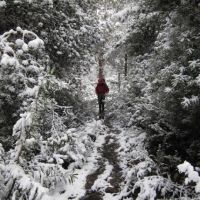 Chris Lamb
Chris LambThis transcription item is now locked to you for editing. To release the lock either Save your changes or Cancel.
This lock will be automatically released after 60 minutes of inactivity.